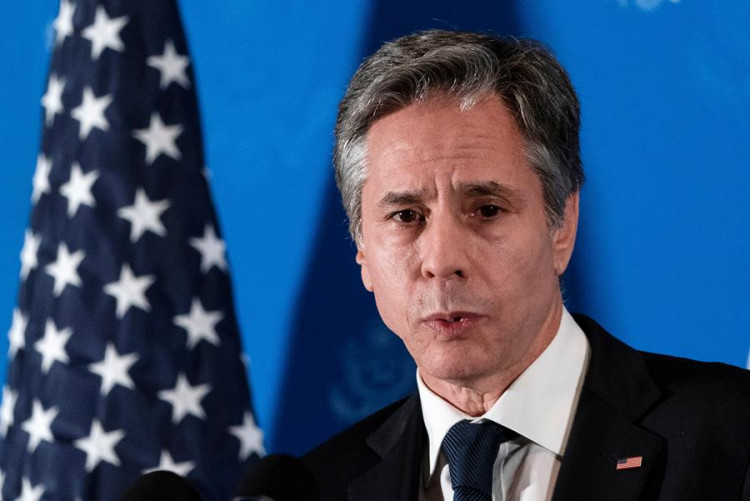In a display of diplomatic agility, U.S. Secretary of State Antony Blinken extended his Middle East outreach to include a visit with Palestinian President Mahmoud Abbas in Ramallah, amidst the intense backdrop of the Israel-Hamas conflict. The unannounced stopover, under the cloak of heightened security, underscores the Biden administration's concerted effort to curtail civilian affliction in the Gaza Strip and foster a vision for the region's future beyond the current hostility.
Blinken's journey to Ramallah unfolded just hours following an Israeli airstrike on a Gaza refugee camp which, according to local health officials, claimed over 40 lives. Despite the State Department's initial reticence to disclose the visit, news of his arrival sparked protests. Demonstrators openly condemned U.S. support for Israel, a sentiment visually underscored by their stark signage.
The closed-door dialogue between Blinken and Abbas concluded without a public briefing, though its significance was palpable. A U.S. official, speaking anonymously, highlighted America's insistence on Israel's responsibility to safeguard civilians and streamline humanitarian aid. Blinken reportedly asserted the Palestinian Authority's pivotal role in any prospective governance in Gaza post-Hamas.
In stark contrast to the proposed U.S. envisioning, Abbas, as reported by the official Palestinian news agency, WAFA, remained steadfast that any power transition in Gaza must be part of a "comprehensive political solution" to the broader conflict. He decried the offensive in Gaza as a "genocidal war" and called for an immediate cessation of hostilities and the essential restoration of utilities and services.
The Ramallah meeting marked a moment in Blinken's broader Mideast odyssey, which had included talks with Israeli Prime Minister Benjamin Netanyahu and consultations with Arab ministers. Each step reiterated the U.S. endorsement of Israel's self-defense, accompanied by a clear message on civilian protection and the need for humanitarian support. However, the proposition of rolling humanitarian pauses to Israeli operations, a potential salve for the region's suffering, faced rejection from Netanyahu.
Growing international outcry over the Palestinian casualty count - surpassing 9,700 as per Gaza's Hamas-run health ministry - has exerted pressure on the global stage, propelling large-scale demonstrations from Washington to Berlin, all unified in their appeal for an immediate armistice.
The sentiment for a ceasefire was echoed in Blinken's encounter with Arab leaders in Amman. Nonetheless, Blinken maintained that an outright ceasefire would not address the core issue, suggesting instead that temporary humanitarian respites could offer relief without undermining Israel's strategic objectives.
The Arab response to the U.S. call for an escalated involvement in crisis resolution is tinged with hesitation, highlighting a complex interplay of regional dynamics and the need for immediate humanitarian action. As U.S. officials navigate this intricate geopolitical landscape, the discourse remains fixated on the elusive quest for a stable successor to Hamas's governance in Gaza, a topic that continues to be met with cautious reservation.
The ongoing deliberations and their associated complexities reflect not only the immediate concerns but also the profound implications for the region's long-term stability, a balancing act that the U.S. diplomatic mission continues to navigate with urgency.





